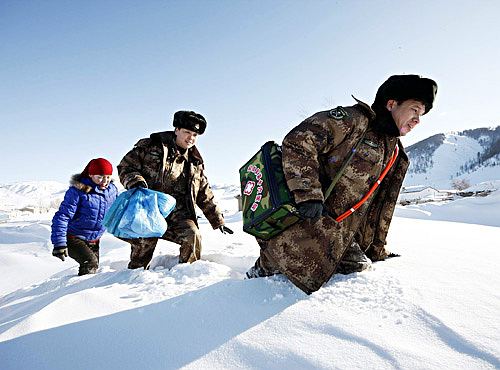|
 |
|
FIRST AID: A medical team sent by the No.16 Hospital of the People's Liberation Army maneuvers through heavy snow to provide services to villagers hit by a blizzard in the northern part of Xinjiang on January 27 (LI XIANG) |
Heavy snowfall that triggered avalanches on January 1-8 in northwest China's Xinjiang Uygur Autonomous Region increased the number of fatalities and damages that have already accrued over this year's extreme winter weather.
As of January 27, the death toll rose to 20, including nine from Altay Prefecture and 11 from Ili Kazak Autonomous Prefecture, according to regional department of civil affairs officials. More than 160,000 people have been evacuated and 1.5 million in total have been affected. More than 30,000 houses have been damaged and direct economic losses stand at an estimated 640 million yuan ($94 million).
Snow reached an average of 50 cm deep, with mountainous areas seeing drifts of up to 2 meters. The cold snap pushed temperatures in some areas to nearly minus 46 degrees Celsius. The blizzard also heavily affected transportation. Snow delayed or canceled 122 flights at the airport in the regional capital of Urumqi, leaving more than 4,000 passengers stranded.
On January 21, strong winds closed the three major highways of Tacheng City in northern Xinjiang, leaving 4,000 motorists stranded, said Wang Xinbao, Director of the City Department of Transport.
The regional government transported feed to Altay and Tacheng, where livestock had eaten half of the forage in stock.
An avalanche on January 26 stranded 2,000 motorists in more than 200 vehicles on a highway for more than 10 hours. The avalanche hit a village in Narat, Xinyuan County, Ili Kazak Autonomous Prefecture, and killed five people. Nine others were trapped.
The Ministry of Civil Affairs and the National Disaster Reduction Commission launched a national disaster emergency response to assist local relief workers. Disaster teams were also deployed to regions hit hard by snowstorms, the ministry said.
On January 19, the Central Government allocated 124 million yuan ($18.2 million) to help people suffering from the winter weather in Xinjiang and the Inner Mongolia Autonomous Region, which had also been impacted.
The Ministry of Finance said 74 million yuan ($11 million), or 60 percent of the total, will be used to help relocate residents, provide basic living necessities and rebuild battered homes. The other 50 million yuan ($7 million) will be used to help farmers and ranchers restart production.
The Central Government has also allocated 197 million yuan ($29 million) to help areas restore agricultural production, renovate and maintain school buildings and purchase equipment.
The Red Cross Society of China has also provided quilts, tents and funds totaling 560,000 yuan ($82,000).
On January 23, two Chinese military helicopters delivered 10 rescue workers to Xemirxek in Altay to search for missing people.
Fourteen people that had been trapped in the blizzard were rescued by the military and sent to hospital for treatment, according to Niu Zhigang, Vice Chief of Staff of the Altay sub-command of the Xinjiang Uygur Autonomous Region military area. Helicopters also airdropped almost 4 tons of relief supplies in the Kelumutu River Valley and three Altay villages on January 23.
On January 23-24, Chinese Premier Wen Jiabao visited Altay and Tacheng. He promised to take effective measures to help people through Xinjiang's worst snow in six decades.
"The Spring Festival (China's lunar New Year) is drawing near. We must implement relief measures and make sure that people in blizzard-hit regions will have a peaceful and happy festival," Wen said at a meeting with Xinjiang officials. "The focus of our work is to maintain people's livelihoods, agriculture and animal husbandry operations, supplies of commodities and transport services."
Wen also said the government would offer subsidies and discounted loans for shepherds, and that assistance would continue into the spring. | 